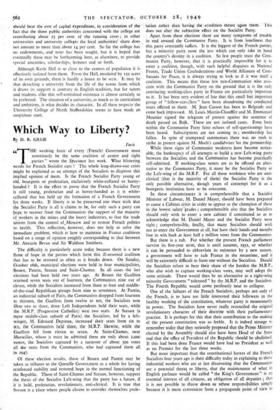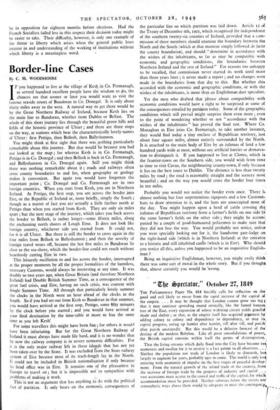Which Way to Liberty?
By D. R.
Paris HE working basis of every (French) Government must notoriously be the same coalition of centre and right parties " wrote the Spectator last week. What blistering words for French Socialist ears ! The whole long-drawn-out crisis might be explained as an attempt of the Socialists to disprove this implied opinion of them. Is the French Socialist Party young or old, bourgeois or proletarian, exclusively white-collared or horny- handed ? It is the effort to prove that the French Socialist Party is still young, proletarian and as horny-handed as it is white- collared that has held up the formation of a French Government fpr three weeks. If liberty is to be preserved one must wish that the Socialist Party is all it claims to be, for only such a party can hope to recover from the Communists the support of the majority of workers in the mines and the heavy industries, to free the trade unions from the control of, Moscow and to restore French politics to health. This reflection, however, does not help to solve the immediate problem, which is how to maintain in France coalitions based on a range of opinion roughly corresponding to that between Mr. Aneurin Bevan and Sir Waldron Smithers.
The difficulty is particularly acute today because there is a new flame of hope in the parties which form this ill-assorted coalition that has to be restored as often as it breaks down. On Sunday, October 16th, municipal elections were held in four municipalities, Rouen, Pantin, Sceaux and Saint-Chamas. In all cases the last elections had been held two years ago. At Rouen the Gaullists retained seven seats out of fourteen, the Communists nine out of eleven, while the Socialists increased from three to four and middle- of-the-road Republican groups from nine to seventeen. At Pantin, an industrial suburb of Paris, the Communists dropped from fourteen to thirteen, the Gaullists from twelve to ten, the Socialists rose am two to three, three Left Independents held their seats, while the M.R.P. (Progressive Catholics) won two seats. At Sceaux (a snore middle-class suburb of Paris) the Socialists, led by a left- winger, M. Edouard Depreux, increased their seats from six to ten, the Communists held three, the M.R.P. likewise, while the Gaullists fell from eleven to seven. At Saint-Chamas, near Marseilles, where it must be admitted there are only about 2,000 voters, the Socialists captured by a turnover of about 30o votes all the seats from the Communists, who had captured them all to 1947.
Of these election results, those of Rouen and Pantin may be taken as tributes to the Queuille Government as a whole for having reinforced stability and restored hope in the normal functioning of the Republic. Those of Saint-Chamas and Sceaux, however, support the thesis of the Socialist Left-wing that the party has a future, if if is bold, proletarian, revolutionary, anti-clerical. It is true that Sceaux is a place where people choose to consider themselves prole- ...tartan -rather than having- the -condition thrust upon them. This does not alter the subjective effect on the Socialist Party.
Apart from these elections there are many symptoms of trouble in and around the Communist Party. , It is from loneliness that this party constantly suffers. It is the biggest of the French parties, but a minority party none the less which can only take in hand the country's destiny in a coalition. So few people trust the Com- munist Party, however, that it is practically impossible for it to enter a coalition, though, with such helpful disguises as National Fronts, Trade Union Confederations-and World Alliances of Com- batants for Peace, it is always trying to look as if it was itself a coalition. This means that those few non-Communists who asso- ciate with the Communist Party on the ground that it is the only convincing working-class party in France are particularly important to it. It has been very evident of late that this small but important group of " fellow-travellers " have been abandoning the conducted tours offered to them. M. Jean Casson has been to Belgrade and come back impressed. M. Louis Martin-Chauffier and M. Emmanuel Mounier signed the telegram of protest against the sentence of death passed on Rajk. These are not isolated cases. Even from within the Communist Party faint echoes of self-questionings have been heard. Subscriptions are not coming in ; membership has fallen. In spite of trumpeted summonses there was no rush to strike in protest against M. Moch's candidature for the premiership.
While these signs of Communist weakness have become notice- able, the bankruptcy of all attempts to build a new Left-wing party between the SOcialists and the Communists has become practically self-admitted. If working-class voters are to be offered an alter- native to the Communist Party, it must be the Socialist Party or the Left-wing of the M.R.P. For all those workmen who are anti- clerical (that is the majority of them) the Socialist Party is the only possible alternative, though years of contempt for it as a bourgeois institution have to be overcome.
In these circumstances it is comprehensible that a Socialist Minister of Labour, M. Daniel Mayer, should have been prepared to cause a Cabinet crisis in order to appear as the champion of those in the lowest salary'grades ; comprehensible also that the Socialists should only wish to enter a new cabinet if constituted so as to acknowledge that M. Daniel Mayer and the Socialist Party were right ; comprehensible, finally, that many Socialists should wish not to enter the Government at all, but have their hands and mouths free to win back at least half a million votes from the Communists.
But there is a rub. For whether the present French parliament survive its five-year term, that is until autumn, 1951, or whether it can be persuaded to abbreviate its existence by a new statute, a government will have to rule France in the meantime, and it will be extremely difficult to form one without the Socialists. Should the Socialists refuse to bear their share of the burden the M.R.P., who also wish to capture working-class votes, may well adopt the same attitude. There would then be no alternative to a right-wing minority Government " tolerated" by the M.R.P. and the Socialists. The Fourth Republic would come perilously near to collapse.
One of the failures of the French Socialists, perhaps not only of the French, is to have too little interested their followers in the healthy working of the constitution, whatever party is momentarily in power. The Socialists have never really reconciled the original revolutionary character of their doctrine with their parliamentary practice. It is perhaps for this that their contribution to the making of the present constitution was so feeble. It is indeed strange to remember today that they seriously proposed that the Prime Minister elected by the Assembly should also have been Head of the State and that the office of President of the Republic should be abolished. If this had been done France would have had no President as well as no Premier for the last three weeks.
But more important than the constitutional havers of the French Socialists four years ago is their difficulty today in explaining to those industrial workers who arc at last discovering that the Communists are a potential threat to liberty, that the maintenance of what in English parlance would be called " the King's Government " is an essential interest of all citizens, an obligation of all deputies ; that it is not possible to throw down or refuse responsibilities simply because it is more convenient from a propaganda point of view to be in opposition for eighteen months before elections. Had the French Socialists failed less in this respect their decision today might be easier to take. Their difficulty, however, is only one example of the threat to liberty which arises when the general public loses interest in and understanding of the working of institutions without which liberty is a meaningless word.







































 Previous page
Previous page